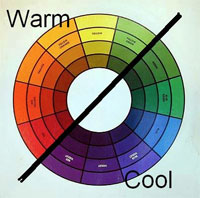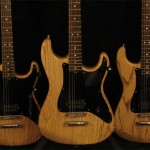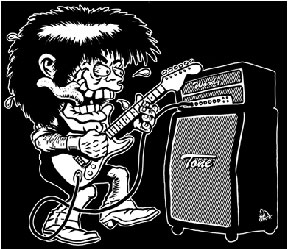Line 6 Guy: Warmer, Fuller = Good Tone
PremierGuitar.com had an article on its website titled “The Science of Tone.” Caught my eye, read it, turned out to be only semi-interesting. The bottom line of the article is that there really isn’t much of a science because it’s all in the ears of the beholder, and everyone’s ears are different. Duh.
Having said that, the article did have a few interesting tidbits – don’t think the article is worth a full read.
> Quote from Scott Waara, product manager at Line 6: “Everybody hears differently, and the frequency response of everyone’s brain is different, so some things that are cool to some guys are not going to be cool to other guys. You can put it on a scope and see what’s happening on a frequency graph and you’ll see some tendencies and trends and so on.â€
> PG: “The trends seen by the Line 6 staff seem to indicate that warmer, fuller tones are more generally accepted and considered ‘good.'”
> “Tone that emulates the human voice is always more accessible,†Waara continues. “Otherwise, purely electronic music would have taken over, and we wouldn’t be making guitars anymore. There are some absolutes in human DNA about wanting to feel connection and that’s probably a fuller frequency tone, that’s tone that is more reminiscent of the human voice. Or, for instance, a violin or organic instruments that have been around for hundreds of years. When we talk about guitars having an organic quality, it’s because that’s rooted in what human beings know. Which is air moving, wood vibrating, people speaking.â€
Comments
Interviewing someone from Line 6 is very interesting since they work on tone modeling. “Warmer, fuller” is interesting too, and makes sense, but to me makes less sense for guitar tones in a band situation because a bassier guitar tone often gets lost in the bass and drum frequencies. An extreme example of this is uber-detuned metal junk.
I’m reminded of this quote from John Suhr on his website: “For years I played a solid guilt maple [guitar] with a rosewood board neck and a Floyd. Bright you think? Not really. The Floyd isn’t very bright [!!]…sort of neutral, and the rosewood warmed it up. I used a hot-dark bridge pickup.
“All this equaled a combo that was a killer shred guitar and never got lost behind the keyboards. The only disadvantage was the price of the wood and the fact it wasn’t the lightest guitar in the world. Sometimes a guitar or a sound will sound killer in your living room but just not cut properly with a band. ”
What We Think We Hear
Here’s another quote from the article, this time from Dr. Andre Millard, a professor at the University of Alabama-Birmingham and editor of “The Electric Guitar: A History of an American Icon.”
“We don’t hear what’s out there. We hear what we think we hear. It’s the psychological or neurological way we hear. To think we hear what sound is out there is so naïve and so wrong.”
Comments
I get this in theory, and I am sure we’ve all been exposed to it – where someone swears that so-and-so has “nailed” the tone or even playing of a certain tune, and we listen and are like, “Uh…yeah. Not really.” But you can’t convince the other guy.
Still, a LOT of people can hear subtle differences in tone and, when mimicking well-known axe-slingers, can tell when they or someone else really do nail it. So a lot of us must “think we hear” the same thing. Here’s an example, or test: Those of you who don’t think this is Tone Woody-inducing, raise your hand:
The Hands
The PremierGuitar.com article concludes with an obvious point when it comes to tone-chasing: It’s in the hands.
> From the article: “As part of his Alien Music Secrets course…Steve Vai often talks about a day when Eddie Van Halen paid him a visit. EVH stood in Vai’s home studio, picked up Vai’s guitar, played it through Vai’s effects, through Vai’s amps, and out came the classic Van Halen tone.”
> A guy named Clive Brown is quoted talking about Hendrix: “He played an SG, a Les Paul, a Flying V as well as a Stratocaster, but he always sounded like Hendrix. He didn’t suddenly sound like Jimmy Page because he played a Les Paul. That’s where everybody’s perception seems to go wrong. It’s the playing, and not necessarily the guitar.”
> John Suhr says on the same page of his website: “I was never as so convinced as one day listening to Eddie Van Halen record at his studio. The sound was fat, articulate and every bit his signature tone. When I looked to see what he was playing I was stupefied to see a headless, woodless Steinberger. Not only that but when I checked out the guitar later, the strings were very rusty.”
Comments
It seems the above comments are partly about style, so I’m not 100% on-board with them.
> I believe EVH sounded like “EVH playing through Vai’s rig.” I highly doubt that it sounded like Ed’s brown or Sammy-era Eventide sounds.
> Hendrix played those different guitars through his same rig. So his hands, effects and amps were constants – the only thing that changed was the guitars. So of course he sounded the same.
> The Suhr story is cool, but again, it was EVH playing through his rig. If it was a Steinberger, that meant it was the Sammy era so it wasn’t the brown sound – it was the fatter Eventide Harmonizer sound. So John might have been shocked that Ed was playing a plastic Steinberger, but it was still Ed’s hands through Ed’s rig.
Conclusion
Somewhere near the end of the article, the PG writer notes that tone “ultimately [is] not a question that science can solve.”
Duh.
The article also seems indicate that tone is entirely subjective – which it is, but again, that doesn’t mean that people’s ears are so different that only 50% of guitar players (50% = random chance) will like a killer tone and the rest don’t. To use an easy example: If that was the case, Line 6 wouldn’t have a business.
And it neglects to mention that you can educate your ears (and brain) to recognize good tone, or what you consider good tone.
I think I’m done writing about that article….
What do you think about all this?
Notable
> The article notes that “our templates of what we consider to be great tone are not simply a formula of instrument + amps + musician. Recording studios also play a vital role in the creation of those sounds.” Yes! An often-overlooked point, especially when it comes to vintage-like tones.
Category: Edward Van Halen, Jimi Hendrix, Line 6, Metropoulos (Metro) amps, Steve Vai, Suhr














